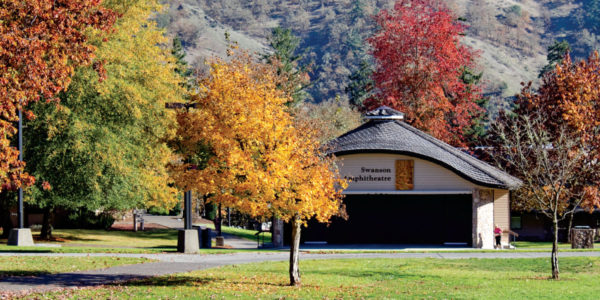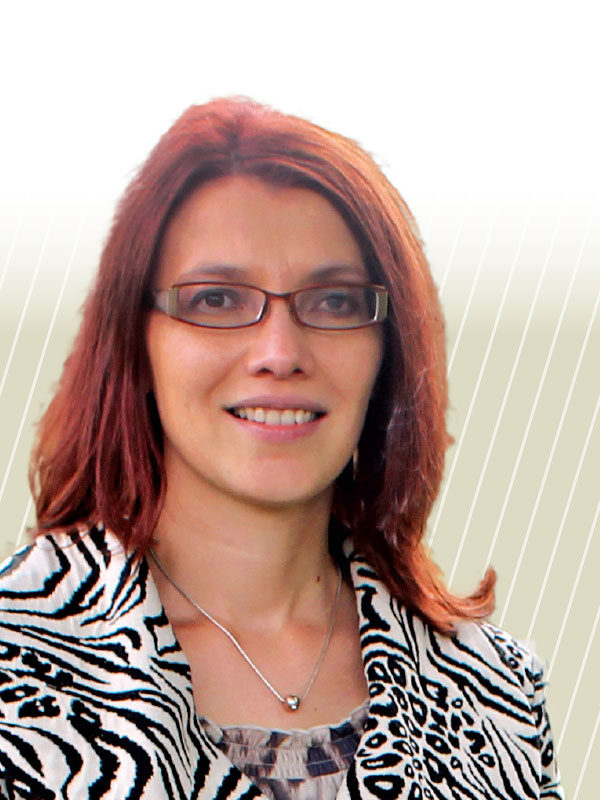People back home in Lesozavodsk considered her goal a student’s pipe dream.
“Even my family had doubts that my dream of coming to America would materialize,” recalls Natalya K. Brown. “I just kept hoping, and working on it. I took the TOEFL tests, doing my best. When I received an invitation for a visa interview, it all became very real.”
Born and raised in Russia, Brown graduated from the Ussuriysk State Pedagogical Institute in 1998, where she majored in foreign language education. “I wanted to practice English and experience American culture firsthand,” she explains. “I came here on a student visa and kind of started my life over at Umpqua Community College as a business administration student. I supported myself as much as I could by working on campus, and once I finished my associate’s degree, it became the basis for my Russian bachelor’s degree. After I landed a job at UCC, I pursued my MBA.”
Now the director of accounting and finance at UCC in Roseburg, Ore., Brown supervises one part-time and six full-time employees. Of the many functions she oversees, she worries most about activities that could harm internal and financial controls. “External fraud, phishing, and different viruses evolve daily,” she says. “Financial security is always in the back of my mind.”

Why did you remain in the America?
I fell in love with this country. The first two years I spent in the U.S. were the happiest of my life.
How did you end up at Umpqua Community College?
After I graduated from college in Russia, I looked into ways I could practice English and learn about the American culture. A couple of Peace Corps volunteers from this area of Oregon introduced me to the concept of a community college. I decided this would be the most affordable way to further my education. I applied to several community colleges, but Umpqua was the only one that responded personally—there was an actual person behind the e-mail. I received automated replies from all the others.
In 2001, after I landed my first serious job here, it never made sense to leave.
How does education in Russia compare to that of the U.S.?
Both cultures face similar challenges in curriculum, testing, and instruction; the differences are in how the systems are organized. In Russia, in the ninth grade, students are required to take an exam. Scores from this exam then help students and their parents make decisions about the future. Students can choose, for example, to go to a vocational school, or they can continue through grade 11, where they will be required to take another significant exam. The higher the score on this exam, the less money students have to pay for their education at the university. Top scores can mean a free education.
Another difference: In Russia, when you start your college education, the program and path are determined. Students have less flexibility to change majors.
Do you still have family back home in Russia?
I do. My parents; my brother and his family; and all my cousins, aunts, and uncles are in Russia. My family never wanted to come to the U.S. to live. They don’t speak English, and they have fulfilling jobs there.
Do you go back to visit?
We mostly stay in touch through Skype and social media. I check in on my parents on a weekly basis, but travel is difficult because of the cost, demands of my job, the cold climate, and travel time (it takes about two days to reach their destination, above China).
What part does social media play in your life and career?
I’m a private person. I only use it to stay in touch with my family. I don’t express my opinions or involve work-related activities on social media.
What’s the biggest risk you have taken?
Deciding to travel halfway across the world to a foreign country, which ended up dramatically changing my life.
What was the hardest adjustment for you initially?
As strange as it sounds now, transportation and moving from point A to point B. While I was a student in Russia, I largely relied on buses and trains to get around the city. Although my family owned a car, we didn’t use it for day-to-day activities, like getting to school or work or shopping. Everything seemed to be within walking distance. When I arrived here, I had to learn how to drive.
Eventually, I got a car, and now I can’t imagine my life without it.
Does UCC have many foreign exchange students on its campus?
When I came to the U.S., we had an international student program with about 20 students from around the world, including Korea, China, Japan, and Africa. That made it very exciting. The campus no longer has that program, but is trying to have it re-established.
Roseburg is a small community. Establishing lodging with families for students was a challenge, since we don’t have student housing.
So where did you stay?
I stayed with the Peace Corps volunteers with whom I became friends in Russia. I later moved closer to campus and rented a room from a lady who became my second mom.
Since you started at Umpqua in 2004, you have been promoted three times. To what do you attribute your upward mobility?
I have a strong work ethic, and I like challenges. They energize me and make me grow. That’s probably how I ended up in the United States. English was my least favorite subject when I was introduced to it in the fourth grade. Because it was so difficult for me, it drove me to do better and it turned into a subject I love.
What’s the most important professional lesson you have learned in your career?
None of us are protected from making mistakes. How we handle them is what matters the most. If you are involved in a mistake, admit it, learn from it, and don’t do it again.
Of course, it’s much smarter to learn from the mistakes of others.
What challenges have you overcome in your life?
The language barrier. Even though I studied British English extensively over five years, I had to train my brain to think in English rather than translating back and forth from Russian to English, which is exhausting. It came with lots of practice. Occasionally, even now, I have moments when my brain backfires, and I can’t think in either language.
Talk about other life-changing events.
When I was two, I suffered a serious eye injury in an accident. I was playing outside when another child threw what turned out to be a piece of limestone that hit me in the eye as I looked up. The limestone caused a chemical burn on my cornea. I received treatments and second opinions in both Russia and the U.S. for the pain, but not much could be done.
Fortunately, my mom instilled in me “Don’t take no as a final answer.” About six years ago, there was a new development that involved taking stem cells from my good eye and putting them in the injured one. It was risky, but it worked, and I am now pain free.
How do you unwind from the pressures of the job?
Camping, kayaking, and fishing with my husband Roger and our son, who is almost 11 years old. My family comes first. My son has been taking tae kwon do, a form of martial arts, for five years. Instead of wasting time waiting for the end of his class, I decided to participate in the class and exercise with him.
MARGO VANOVER PORTER, Locust Grove, Va., covers higher education business issues for Business Officer.



